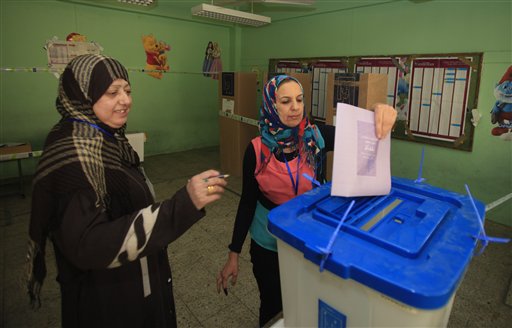BAGHDAD – Iraq carried out its first election since the U.S. military withdrawal without major bloodshed Saturday in a major test for Iraqi security forces as they face a reviving al-Qaida insurgency.
But delayed elections in two provinces wracked by anti-government protests and complaints about missing names on voter rolls overshadowed the vote.
The results will be a key measure of support for the country’s vying political coalitions and could boost the victors’ chances heading into next year’s parliamentary elections. Thousands of candidates from 50 electoral blocs were vying for 378 seats on provincial councils, which hold sway over public works projects and other local decisions.
Officials ratcheted up security to thwart insurgent attempts to disrupt the vote. Nearly all cars were ordered off the roads in major cities, leaving streets eerily empty and giving children a chance to play soccer in the middle of highways.
Scattered violence — mainly mortar shells and small bombs – struck near polling places. But they resulted in no fatalities — a departure from a wave of bloodshed earlier in the week. Six people were reported wounded Saturday.
As in past elections, voters dipped their fingers in purple ink after casting their ballots to prevent repeat voting.
Among them was Oday Mohammed, a businessman who brought his mother, wife and children along with him to vote for a candidate from Prime Minister Nouri al-Maliki’s State of Law bloc. He said he believes both candidates and voters are growing more experienced with the democratic process following the 2003 ouster of dictator Saddam Hussein.
“Not all politicians are corrupt. There are some good people,” he said at a polling center in the mainly Shiite district of Kazimiyah.
The vote comes at a time of rising tensions between Iraq’s Sunni Arab minority and the Shiite majority that has dominated politics since the U.S.-led invasion a decade ago.
In a reflection of those sectarian strains, many voters said they were encouraged to participate by religious leaders.
“I don’t have any hope that the situation will improve, but I had to take part because our clerics asked us to so we don’t lose out like in in the past,” said Anwar al-Obaidi, a 60-year old Sunni barber in Baghdad.
Send questions/comments to the editors.



Success. Please wait for the page to reload. If the page does not reload within 5 seconds, please refresh the page.
Enter your email and password to access comments.
Hi, to comment on stories you must . This profile is in addition to your subscription and website login.
Already have a commenting profile? .
Invalid username/password.
Please check your email to confirm and complete your registration.
Only subscribers are eligible to post comments. Please subscribe or login first for digital access. Here’s why.
Use the form below to reset your password. When you've submitted your account email, we will send an email with a reset code.